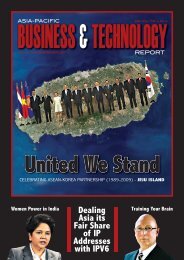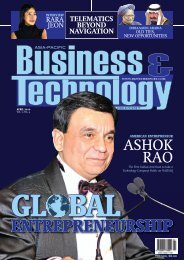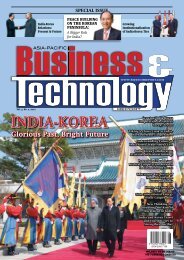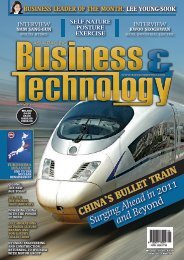GreeN Growth - Asia-Pacific Business and Technology Report
GreeN Growth - Asia-Pacific Business and Technology Report
GreeN Growth - Asia-Pacific Business and Technology Report
- No tags were found...
Create successful ePaper yourself
Turn your PDF publications into a flip-book with our unique Google optimized e-Paper software.
technologywww.biztechreport.comThomas Perkins | Dreamstime.com<strong>Asia</strong>n SchoolsGo High-Techwith iPadsBy Lynette WuThe phenomenal rise ofApple’s iPad is changingthe face of mobilecomputing in almost all majoraspects of <strong>Asia</strong>n society,including education.Schools in more economically-advanced<strong>Asia</strong>n countries are now going high-techwith the integration of the iPad <strong>and</strong> othersimilar tablet devices as a comprehensivelearning solution for their students, whichwill eventually replace traditional paperbasednotepads.Using digital books will make it a lot easierfor students in these <strong>Asia</strong>n schools touse the tablet as a primary learning tool insteadof physical textbooks <strong>and</strong> notebooks.iPads <strong>and</strong> tablets can store literally thous<strong>and</strong>sof pages of textbooks that studentscan easily access as well as serve as a notetakingdevice. Not only will students doaway with lugging heavy school bags filledwith books, pens, <strong>and</strong> paper when going toschool, but a paperless classroom will begood for the environment as well.In Japan, the Future School project is alreadyunderway with classrooms from tendifferent elementary schools fitted withelectronic blackboards which will be amore interactive communication platformbetween the school <strong>and</strong> the students. Asidefrom that, Japanese students from theseschools will be provided with one tableteach as a primary learning tool.In South Korea, schools are equippedwith WiFi zones <strong>and</strong> these areas are used bythe education ministry as a testing groundfor digital textbooks to which students canhave access. These online texts would bepart of the education ministry’s plan of supplyingtablets to all schools nationwide.The education ministry in Singapore, acountry known for its high level of math<strong>and</strong> science education, will be providingschools with grants to purchase tablets,software <strong>and</strong> services. One example is theNanyang Girls’ High School, where morethan 120 students <strong>and</strong> 16 teachers werealready provided grants to the tune of100,000 Singapore dollars. These grants arein line with the nation’s goal of providingone iPad to each student in the country by2013.Redefining the Classroom in<strong>Asia</strong>n SchoolsClassrooms around the world todaygenerally look the same that they did incenturies past. But everything is changingnow in this digital age, particularly in <strong>Asia</strong>nschools, which are already way ahead inthe game of digitizing education. Learningwill also evolve from traditional teacherstudentinteraction, but tablets will makeit easier for students to give learning feedbackto one another using their tools <strong>and</strong>online resources.In some schools in Singapore, where theuse of iPads <strong>and</strong> similar devices are now beingused extensively by both teachers <strong>and</strong>students, learning can be both fun, interactive,<strong>and</strong> more interesting with these devices.Students can move numbers aroundto study factorization or learn more aboutparts of the cell or the human body by simplyclicking on a section in a diagram. Thehuman DNA double helix structure cancome alive on the screen, making it moreinteresting for students to learn. These <strong>and</strong>other similar educational applications arebeing developed <strong>and</strong> made available for thetablet.The growing penetration of tablets in<strong>Asia</strong>n schools is just a reflection of the device’spopularity in mainstream society.Sam Han, an instructional technology fellowat the City University of New York <strong>and</strong>a US-based expert on the role of technologyin education, foresees that the use oftechnology in some <strong>Asia</strong>n countries mayeven surpass or leapfrog that of the West.According to Han, this is primarily due togreater broadb<strong>and</strong> Internet access penetrationin these countries as well as better Internetinfrastructure than countries in theWest, including the United States.Not all experts are keen on loosely dumpingtechnology on <strong>Asia</strong>n schools. Educationexperts <strong>and</strong> psychologists are concernedthat students may get distracted with theavailable social networks <strong>and</strong> games online,which would be accessible from theirtablets. Thus they could neglect the maingoal of the device as an educational tool.The penetration of social media among<strong>Asia</strong>n youths is very high <strong>and</strong> has growneven more so with the proliferation of tablets,smartphones, <strong>and</strong> other web-enableddevices. Providing students with Internetconnectedtablets would give them freereign to access social networks or playonline games instead of studying their lessons.However, these experts also acknowledgethat the use of technology in schoolsis inevitable <strong>and</strong> will be the trend of educationalsystems in the future. Tablet makersare now developing devices intendedfor educational purposes, <strong>and</strong> alongsidecome software developers that will providevarious applications intended for teachingor learning. Educational applications <strong>and</strong>online learning systems could actually increasestudent thought <strong>and</strong> analytical skills– once they overcome the novelty aspectsof owning an iPad or a tablet.Tablet Makers Targeting theEducation MarketRupert Murdoch, the famous media mogulknown for his News Corp group, saidin one of his speeches that the use of tabletcomputers <strong>and</strong> the rush of software applicationsthat goes with it for educationalpurposes would be a huge business withan immense potential growth. Murdochsaid that education technology is the “lastholdout from the digital revolution” <strong>and</strong>his own company would be pushing intothe realms of this new market. His vision isto provide a personalized learning systemwhere lessons will be delivered by someof the world’s best teachers to studentsaround the world using the Internet.Apple’s iPad is expeted to be the primarytool to deliver this educational technologysystem, but it would not be the only one.Several tablet makers <strong>and</strong> start-up technologycompanies are joining the b<strong>and</strong>wagonin providing educational tablets for studentsworldwide. This includes companieslike mySpark Technologies, Vinci Tab, <strong>and</strong>ScrollMotion – all moving towards providingeducation solutions to students <strong>and</strong>changing the way they study, do theirhomework <strong>and</strong> share information withteachers <strong>and</strong> fellow students.Most of these tablets will be based on theAndroid operating system <strong>and</strong> will featurea 10-inch screen where students can download<strong>and</strong> read digital textbooks, run educationalAndroid applications, sync withtheir school calendars, <strong>and</strong> collaboratewith teachers <strong>and</strong> peers using instant messaging.Going beyond the boundaries of traditionaltextbooks, students can learn moreeffectively using these interactive materialsas well as from online educational videos<strong>and</strong> other web-based courses. Tablets likethe MySpark will be provided with a specialstylus which students can use to take down<strong>and</strong> annotate notes.While tablets like the MySpark will betargeting college students, other educationaltablet manufacturers like Vinci Tab willprovide tablets intended for non-schoolage kids. Children can learn <strong>and</strong> feed theircuriosity from the storybooks, games, <strong>and</strong>music videos that will be made available.These applications can provide a focus forthese kids <strong>and</strong> develop their analyticalskills. This will be a better alternative tothe iPad or even the Galaxy Tab, which maybe too heavy <strong>and</strong> unsafe for toddlers <strong>and</strong>young kids.Other startups will focus on providingdigital educational content on their tablets,such as ScrollMotion, which has workedwith traditional educational printed contentfrom publications like McGraw-Hill,providing these materials available to onlinereaders to supplement their education.This digital education-based content rangesfrom the availability of online versions oftraditional education texts to online learningplatforms focused on students from differentlevels.These materials will also feed the naturaltendency of students to socialize even ifthey choose to avoid their schoollibraries to supplement their education.Using the power of socialmedia, students can benefit froma more collaborative learning environmentwhere the collectivelearning input from the studentcommunity will benefit each <strong>and</strong>everyone’s learning journey.Marketplace CompetitionIndustrial research expert Gartnerreported that the worldwidetablet market will almost doubleits sales in 2010 <strong>and</strong> may reachup to 54.8 million units this year.Gartner predicts that the marketwill continue to grow <strong>and</strong> surpass208 million units by the year 2014.The education technology marketwill take a major part in this withindustry leaders Apple <strong>and</strong> Samsungtaking a larger piece of thepie. Other players like educationaltablet startups will focus on nicheeducation areas <strong>and</strong> grab theirshare of the market.This competition among tabletplayers, whether they’re industrygiants like Apple or start-ups likeMySpark, is favorable for educationalinstitutions not only in <strong>Asia</strong>but also in other countries aroundthe world. Each of these manufacturerswants to develop their ownproduct that will provide teachers<strong>and</strong> schools better technologicaltools for learning – all intendedfor the benefit of the students. Studentscan learn better with interactivelearning applications thatwill enhance the learning experience,making it easier for the studentsto study <strong>and</strong> provide teacherswith more effective tools.These new educational platformswill not only foster a newexperience <strong>and</strong> environment forindividual learning, but they willalso facilitate more efficient <strong>and</strong>effective virtual study groups.Students can share educationalcontent with peers, collaborateon school work, <strong>and</strong> collectivelywork on a school project – a better<strong>and</strong> more dynamic learning experiencethat students can easilylearn to enjoy. A-PFurther Reading:• Yahoo Newswww.news.yahoo.com• Channel Insiderwww.channelinsider.com• Gartnerwww.gartner.comCompanies Mentionedin this Article:• Applewww.apple.com• Samsungwww.samsung.com• News Corporation Groupwww.newscorp.comOpportunisticHackersby Meenakshi ShankarAs the world is soaringto ever-greater heightswith innovations incomputer <strong>and</strong> Internet technology,there is an increasinglyhigh risk in terms ofunauthorized use of computer<strong>and</strong> network resources.Computer crime authorities are trying tofind a way to stop hackers who are continuingto gain public attention through high profilehacks. Privacy protection has become a corenecessity in this cyber universe.Regardless of the widespread availabilityof WiFi security tools, nearly half of all homeWiFi networks can be hacked in seconds, accordingto a new survey. <strong>Report</strong>s indicate thatmore than 50 percent of Internet users arevulnerable to serious data security breaches.With steadily increasing users of smartphones<strong>and</strong> wireless networks, it has becomefar easier for hackers to crack usernames <strong>and</strong>passwords.Additionally, today there is a fundamentalsocial shift occurring in hacker culture.Activists are disrupting major corporate <strong>and</strong>government web sites, stealing <strong>and</strong> leakingsensitive data, <strong>and</strong> thereby changing the waywe use the web. There is greater trepidationnowadays with regard to Internet-related securityissues, which are a consequence of anincreasingly technically-adept gang of facelesshackers who are seemingly increasing innumber by their own will.Stree Naidu, vice president of <strong>Asia</strong>-<strong>Pacific</strong><strong>and</strong> Japan at the data security company Imperva,said he believed smartphones had creatednew security problems that had been consideredmainly an issue with web programming.“For example, it is considered a commonsecurity practice to encrypt data transferredfor login forms,” he said. “However, we witnessedthose same forms passing the data inunencrypted format when the login page ispresented via a mobile-dedicated login page.”Mobile security has all the potential to beexploited quite easily by hackers. In September2010, a virus began infecting more than amillion mobile phones in China. Masqueradingas an anti-virus application, the “zombie”let hackers access the phone’s SIM card <strong>and</strong>automatically send spam text messages topeople listed on the phone’s address book.Frost & Sullivan forecasts that smartphonesales in the <strong>Asia</strong>-<strong>Pacific</strong> region alone will doublethis year to 100 million units, accountingfor 20 percent of the mobile devices shippedin this region. Additionally, the informationtechnology research company InternationalData Corp. predicted that downloads of mobileapplications worldwide will rise to 77 billionby the end of 2014 from 10.9 billion in2010.The opportunity certainly exists for hackerswho are capable of creating tremendousdamage. To cite a incident back in March ofDmitriy Shironosov | Dreamstime.comthis year, forty South Korean websites, includingthose of the presidential office, theNational Intelligence Service <strong>and</strong> the defenseministry, were reportedly targeted for threedays in Distributed Denial-of-Service (DDoS)attacks, where it was indicated that maliciouscode flooded the networks with fake accessrequests, causing them to crash. In April,more than 2 million South Koreans lost accessto their accounts at the National AgriculturalCooperative Cooperation, known in Korean asNonghyup Bank.Hacking has also progressed from a stagewhere it was done for fun to a serious enterprisewhere you can make money from sellingcredit card numbers <strong>and</strong> other accountinformation. An attacker could grab multipleauthentication tokens by setting up a Wi-Fi accesspoint with the same name of a commonwireless network provider <strong>and</strong> wait for smartphoneswith default settings to automaticallyconnect to a previously known network <strong>and</strong>start syncing immediately, according to thereport. Here, the attacker could capture authenticationtokens for each service that attemptedto sync.Not only is the calendar data exposed, butalso information about user contacts. An attackercould also change the stored e-mailaddresses of contacts, <strong>and</strong> the user can be atrisk by sending sensitive information to theattacker instead of the intended recipient, theresearchers noted.Hackers smash into computers <strong>and</strong> computernetworks without any authorization<strong>and</strong> cause chaos <strong>and</strong> harm to the owners ofthe system. Most of the culprits are teenagers<strong>and</strong> young adults with criminal intentions.LulzSec, the cyber crime rulers, have hackedwebsites of major companies <strong>and</strong> intelligenceagencies over the past several months.Recently, the electronics giant Sony saidthe names, addresses, emails, birth dates,phone numbers, <strong>and</strong> other information fromPlayStation service customers were stolenfrom its servers as well as an “outdated database”from 2007 which contained details ofaround 23,400 people outside the US. That includes10,700 direct debit records for customersin Austria, Germany, the Netherl<strong>and</strong>s, <strong>and</strong>Spain. Sony’s PlayStation hack incident has alreadysparked legal action <strong>and</strong> investigationsby authorities in North America <strong>and</strong> Europe.In this biggest breach, hackers compromisedthe security of 100 million credit card–backedaccounts on the PlayStation Network.Hackers have also been operating from China<strong>and</strong> stealing sensitive information fromWestern oil companies. Similarly, a targetedattack on Google got to the Gmail accounts ofmany users, which included some high-levelUS government officials. A Romanian hackerclaims to have breached a computer serverat NASA’s Goddard Space Flight Center <strong>and</strong>gained access to confidential satellite data.Internet banking, online shopping, <strong>and</strong> allContinued on Page 4740 | A-P BUSINESS & TECHNOLOGY REPORT A-P BUSINESS & TECHNOLOGY REPORT | 41









